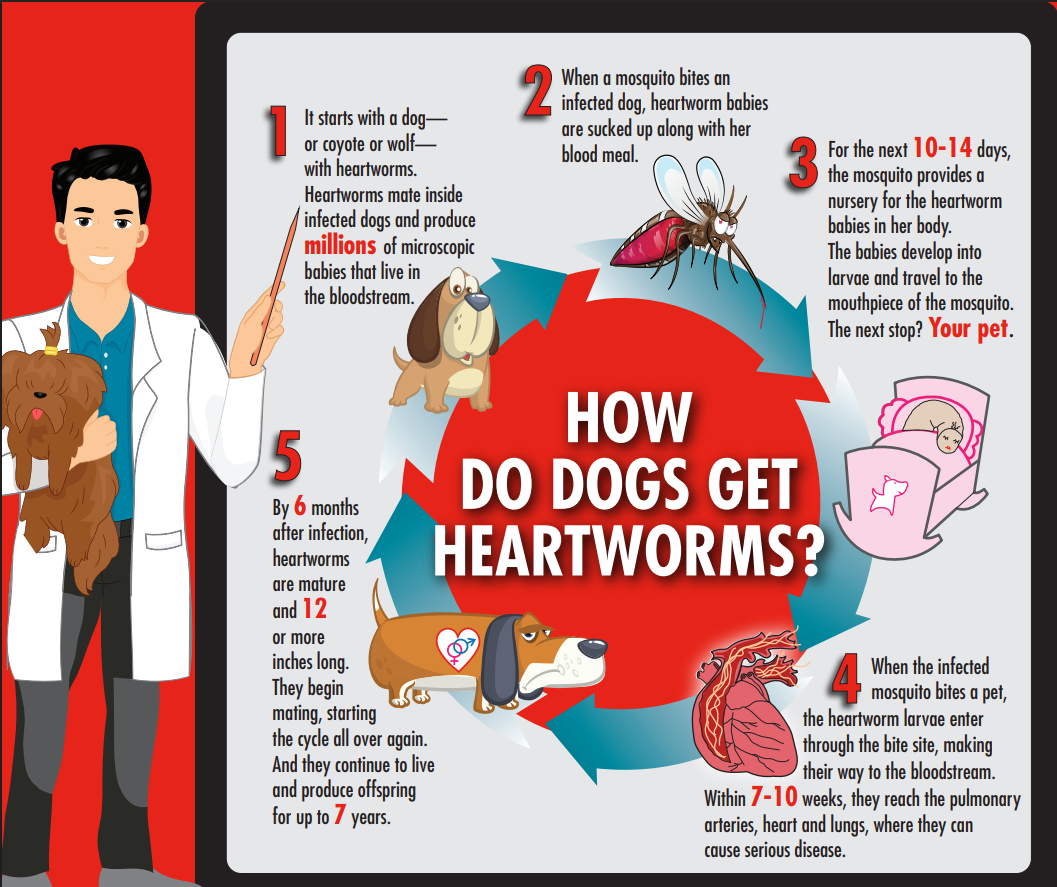Don't Go Breaking My Heart(worm)
Susanna Burgett, LVT • April 11, 2025
Heartwoms Hit Hard: What Every Pet Owner Should Know

April is Heartworm Awareness Month, and here at Southpaw Animal Clinic of Madison, we are all about protecting your pets from preventable pain. Heartworm disease is a serious, potentially fatal condition, that can cost thousands of dollars to treat--but the good news is, it is almost 100% preventable with proper care and consistent protection.
So let's dive into what heartworm disease is, why it matters, and how you can keep your furry friend safe.
What Is Heartworm Disease?
Heartworm disease is caused by a parasitic worm--Dirofilaria immitis--that's spread through the bit of an infected mosquito. Once bitten, the immature larvae enter your pet's bloodstream and grow into adult worms that settle in the heart, lungs, and associated blood vessels. Left untreated, these worms can cause severe lung disease, heart failure, and organ damage.
Why It's So Serious (and So Common)
- Heartworm disease is both common and deadly. More than one million dogs in the U.S. are infected each year.
- It affects dogs in all 50 states--yes, even here in Madison, Alabama.
- Dogs with heartworms often show no symptoms until the disease is advanced, making regular testing critical.
- Symptoms can include coughing, fatigue, weight loss, decreased appetite, and a swollen abdomen due to fluid accumulation.
How Do Dogs Get It?
Simple answer: mosquitoes.
If you seen, swatted, or been bitten by a mosquito, that means your dog has been at risk too. And it only takes one bite from an infected mosquito to pass on the larvae.
Prevention Is Easy. Treatment? Not So Much.
While heartworm disease can be treated, the process is expensive, time-consuming, and potentially hard on your dog. Treatment often includes months of restricted activity, multiple injections, and frequent veterinary visits.
Prevention, on the other hand, is:
- Affordable
- Safe
- Easy to administer (monthly chewables, topicals, or an injection every 12 months)
- Widely available through your veterinarian
At Southpaw Animal Clinic of Madison, we can dispense up to 12 months of prevention per pet, per year. We totally commend those of you trying to stay ahead and stock up--your dedication is awesome--but due to manufacturer regulations, we cannot fill early.
It's also important to note: heartworm prevention is only guaranteed by the manufacturer for the pet it is prescribed to. That means the prescription must be written specifically for your pet--we can't legally or medically share doses between animals, even if they are the same size or species.
Don't Skip the Test!
All dogs 7 months and older should be tested before starting prevention. That's because heartworm preventatives work by killing early-stage larvae--not adult worms. Giving preventatives to a dog with an existing infection can cause severe complications.
Heartworm tests are quick, highly accurate, and a crucial part of responsible pet care. Here's what you should know:
- If you adopted a dog with an unknown medical history, get them tested right away.
- Even if the first test is negative, we recommend retesting in 6 months to confirm there is not an early infection. Why? because it takes 6-8 months for adults infections to show up on a heartworm test.
- Missed a dose? No shame--just let us know. Your pup should be retested 6 months later to make sure they stayed protected. A nominal fee compared to treatment.
Bonus Info: What About Cats and Other Pets?
Dogs aren't the only ones at risk--cats can get heartworms, too, although they're less common and harder to detect. There is no approved treatment for cats, which makes prevention even more critical.
We also recommend discussing prevention options for ferrets and other at-risk- pets with our staff.
Time for a Heart-to-Heart?
If your pet hasn't been tested recently or is overdue for their prevention, now's the time. We're here to help with:
- Heartworm testing
- Affordable prevention options
- Friendly reminders so you never miss a dose
At Southpaw Animal Clinic of Madison, we are all about keeping tails wagging and hearts strong--before there's a problem.
Give us a call
or book online
to schedule your pet's heartworm test today. Let's beat the buzz together.
Contact Us


As your pet’s healthcare team, our goal is to help them live a long, healthy, and happy life. One of the most important ways we do that is through annual bloodwork and parasite testing—even if your pet seems perfectly healthy. Just like in human medicine, routine lab testing allows us to catch hidden health problems early, often before your pet shows any symptoms. Early detection means more effective treatment, better outcomes, and often lower long-term costs for care. What We Learn from Bloodwork Annual bloodwork provides a detailed look at your pet’s internal health. It’s made up of two main parts: a Complete Blood Count (CBC) and a biochemistry panel. Complete Blood Count (CBC) A CBC evaluates the cellular components of your pet’s blood, including: Red blood cells (RBCs) – These carry oxygen throughout the body. Abnormalities may indicate anemia, dehydration, or other systemic diseases. White blood cells (WBCs) – These are the body’s infection fighters. Too many can indicate infection or inflammation; too few can suggest immune suppression or bone marrow issues. Platelets – These help with blood clotting. Low platelet counts can cause bleeding issues, while high counts can signal inflammation or other conditions. The CBC gives us a picture of your pet’s overall immune status and helps identify infections, inflammation, or blood disorders. Chemistry Panel: Checking Internal Organ Function This portion of the bloodwork looks at how well your pet’s organs are working. Some of the key values include: Liver function tests (ALT, ALP, bilirubin, etc.) – The liver filters toxins, metabolizes medications, and supports digestion. Abnormal values may indicate liver disease, infection, or damage from toxins or certain medications. Kidney function tests (BUN, creatinine, SDMA) – The kidneys filter waste and regulate hydration. Elevated values can indicate early kidney disease, dehydration, or other metabolic issues. Pancreatic values (amylase, lipase, sometimes specific pancreatic lipase tests) – These help us detect pancreatitis or other digestive problems that can cause pain, vomiting, or appetite changes. Thyroid levels (T4) – The thyroid regulates metabolism. Low levels (hypothyroidism) are common in dogs and can lead to weight gain, lethargy, and skin issues. High levels (hyperthyroidism) are common in older cats and can cause weight loss, hyperactivity, and heart problems. Urinalysis – Often performed alongside bloodwork, this test gives us additional information about kidney health, hydration, diabetes screening, and urinary tract issues. Fecal PCR Testing Traditional fecal tests look for parasite eggs under a microscope, but fecal PCR testing (polymerase chain reaction) uses advanced DNA technology to identify even small amounts of genetic material from intestinal parasites, including roundworms, hookworms, whipworms, coccidia, Giardia , and more. This method is more accurate and sensitive , meaning we can detect infections that may be missed on a routine fecal float. Regular fecal testing helps keep your pet and your household safe—since some parasites can also infect people. Heartworm and Tick-Borne Disease Testing Heartworm disease, spread by mosquitoes, is a potentially fatal condition that damages the heart and lungs. Even pets on prevention can occasionally be exposed or miss a dose, which is why annual testing is essential . Early detection allows treatment before permanent damage occurs. Many of our annual screening panels also test for tick-borne diseases such as: Lyme disease Ehrlichiosis Anaplasmosis Ticks can transmit these infections without you ever seeing them attached. Testing helps us identify hidden infections before they cause serious illness. Prevention Is the Best Medicine Annual testing gives us a baseline for your pet’s normal values and helps us spot trends or changes over time. Combined with routine physical exams, vaccinations, and parasite prevention, this proactive approach helps your pet stay healthy for years to come. Even if your pet seems perfectly fine, remember— they can’t tell us when something feels off. Routine bloodwork and parasite screening are the best tools we have to listen to what’s going on inside. Schedule Your Pet’s Annual Screening If your pet is due for their annual checkup, now is the perfect time to schedule their wellness exam, bloodwork, and parasite testing . Early detection means a healthier, happier life for your best friend—and peace of mind for you. Call us at 256-870-2092 or request an appointment online today!

Q: My pet is already on Simparica, Nexgard, or Bravecto. Why are you recommending Credelio Quattro instead? Great question! All of those preventions — Simparica, Simparica Trio, Nexgard, Nexgard Plus, and Bravecto — belong to the same drug family called isoxazolines. The main difference is the specific molecule used. Credelio Quattro’s active ingredient is lotilaner, which is considered the safest molecule in this class. It’s so safe that it’s even used in human medicine! This gives your pet strong, fast-acting parasite protection with an excellent safety profile. Q: How fast do ticks transmit disease? It depends on the disease. One of the most common tick-borne diseases in Alabama is Ehrlichiosis, spread by the Lone Star Tick. This tick can transmit Ehrlichia in as little as 3 hours after biting. Credelio Quattro starts killing ticks in as little as 2 hours, working through neuromuscular breakdown to stop them before they can pass on disease. Q: What is Ehrlichiosis, and why should I be concerned? Ehrlichia spp. is a disease that can infect dogs, cats, and even people (that’s right — it’s zoonotic). Symptoms in pets can include fever, low energy, depression, loss of appetite, and weight loss. Preventing ticks from biting — and killing them quickly if they do — is the best way to protect your whole family. Q: How common is Ehrlichiosis here? In 2025, statewide in Alabama, 1 in 30 dogs tested positive for Ehrlichia, according to the Companion Animal Parasite Council (CAPC). Madison County: 1 in 50 dogs Limestone County: 1 in 30 dogs The reason Madison County numbers are lower is because more owners are consistently using tick prevention that works fast enough to stop transmission. Credelio Quattro is the only isoxazoline proven to kill the Lone Star Tick the fastest — and it lasts twice as long in the body as similar products. Q: Does Credelio Quattro protect against other ticks? Yes! It also kills ticks that spread Lyme Disease and Anaplasmosis. Q: What else does Credelio Quattro protect against? It’s more than just a tick killer — it’s an all-in-one monthly chew that protects against: Heartworm disease Fleas 3 species of tapeworms Roundworms Hookworms It starts protecting against heartworm disease from the very first dose. Q: What’s this “manufacturer guarantee” you mentioned? When purchased through our clinic or our trusted online pharmacy ( Vetcove Home Delivery ), Elanco — the manufacturer — guarantees the product. That means if your pet develops a parasite or disease listed on the label despite using Credelio Quattro as directed, Elanco will pay for testing and treatment (up to a set dollar amount). If you buy from a third-party pharmacy that isn’t connected to our clinic, you’d need to file the claim yourself. Q: Do I need a heartworm test before starting Credelio Quattro? If your pet has been on another prevention and is 4 months or older, we’ll do a heartworm test 6 months after starting Credelio Quattro. No test is needed right before starting unless doses have been missed. Q: What if I miss a dose? If you miss a dose, your pet will need to be retested for heartworms 6 months after restarting the prevention to keep the manufacturer guarantee active. Bottom line: Credelio Quattro works faster, lasts longer, and protects against more parasites than most preventions. In Alabama, where ticks and heartworms are a year-round concern, it’s one of the best tools we have to keep your pet safe and healthy. 📞 If you’d like to learn more or find out if Credelio Quattro is right for your pet, call us or send us a message today — we’re happy to help!




Share On: